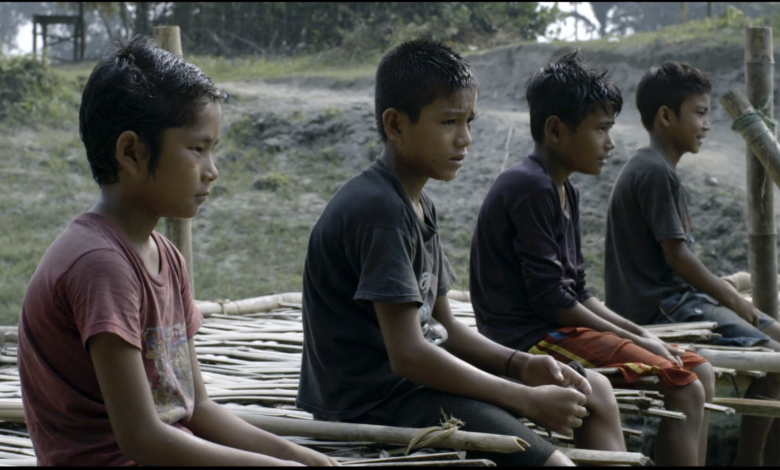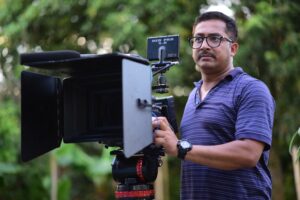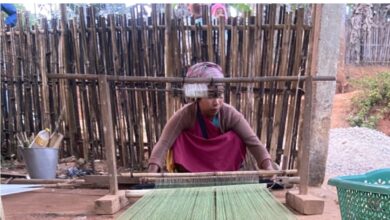School dream & a journey to remember
Award-winning director Biswajit Bora shares his bond with 'Boomba' & the Mishing villagers in Golaghat

A dilapidated building with a leaking thatched roof, a few wobbly benches paired with equally unstable tables which face a forlorn blackboard — this can be the description of a primary school in any part of rural India. While the lack of inclusivity of the country’s education system is deplorable, the perseverance of a few, like Boomba, is commendable.
Boomba is a nine-year-old lower primary student from a remote Mishing village in Assam where, for many poor households which survive on agriculture, education is a luxury. But the boy refuses to give up and is ready to face all odds to have a decent school education.

Assamese director Biswajit Bora’s new film Boomba Ride not only captures the determination of a simple village boy but also focuses on the country’s education system, especially in rural areas where the benefits of laws, policies and various government schemes barely reach.
“I saw a news report a couple of years back and I thought of taking up the issue (of rural education) in my next film,” said Bora about the inception of the film.
The film was recently screened at Olympia at Marché Du in Cannes.
Talking to Sunday Monitor, Bora said his experience as a child helped him understand the problem and depict it on screen. “I grew up in Golaghat in rural Assam and I had witnessed similar problems there. In many rural places, schools do not have proper amenities. So, I wanted to spread awareness on this so that we can collectively take responsibilities to educate the poor students in villages,” said the 42-year-old director.
Born and brought up in the northeastern state, Bora moved to Mumbai two decades ago with a dream to join the film industry. When asked about his journey in the tinsel town, the director, producer, editor and screenplay writer said as a teenager, he wanted to become an actor. When he came to Guwahati in his late teens to join the film industry, he was advised by well-wishers to go to Mumbai and learn non-linear editing.
“There was a demand for non-linear editors in Assam at that time. So, I decided to get into an editing course in Mumbai. Later, I joined a film studio there,” he recollected.
It was in that Mumbai studio where Bora met national award-winning director Jahnu Barua, who liked Bora’s work and asked him to work as his assistant.
Bora attributes his filmmaking knowledge to Barua with whom he worked for about seven years. His first film was a documentary on anthropologist Verrier Elwin, Angel of the Aboriginals: Dr Verrier Elwin, in English that was released in 2009. He had visited Shillong for his research and to speak to Elwin’s immediate family.
“I had limited resources there are so many things to be told about Elwin’s life. His contributions to the development of the North East and welfare of the tribals here are unknown to many in this region. So, I have a wish to remake the documentary so that many people, especially the youths, come to know about this person,” he asserted.
In 2015, Bora made his Bollywood debut with the Hindi film Aisa Yeh Jahaan, the country’s first carbon-neutral movie. Though it was a pathbreaking project, the film did not have much impact in the box office where it had to compete with mainstream movies. It was then that the director understood how important it was to have a box-office impact. He returned to Guwahati to venture into Assamese films. His filmography includes a series of blockbuster local movies, including Bahniman, Phehujali and Raktabeez.
Phehujali, in particular, is close to the director’s heart as the story was based on his personal experiences. “The movie is about dementia. My mother-in-law suffered for 10 years. My in-laws lived in Shillong where my father-in-law, Mohan Chandra Gogoi, was the vice-president of Sankardev College. The film is about their struggles,” Bora said.
Boomba Ride, which is the director’s first film in Mishing language, has been a different journey for Bora who has featured some of the unknown places in Assam in his latest film. From understanding the place and the community to becoming a chronicler of the Mishing culture, Bora’s experience has been “enriching”.
The film was shot in two remote Mishing villages in Golaghat district, Bormokuli and Bokulisapuri. “Though I grew up in Golaghat, I had never visited this part of the district. Road connectivity is poor here and I had to walk 3-4 km to shoot the film. We even crossed a rivulet as the bridge was broken,” Bora said.
All the actors in the film are non-professionals and locals from the Mishing community. Bora said he was amazed to see the contended lives of the villagers despite such lack of development.
As the film was made with shoe-string budget, it was difficult for the director to get professional actors. But that was no deterrence as he was confident to find the best talents from among the locals. For instance, Bora met Indrajit Pegu, the Mishing boy who played the protagonist in Boomba Ride, at a grocery shop, and “instantly his eyes caught my attention and I knew he was my Boomba”.
The non-actors were trained for a few days before the shooting of the film began. The director especially took care with the child artiste with whom he spent days to explain the story and make the boy comfortable.
“None in the village has ever seen a movie theatre and nobody knows what Cannes is. But I was confident that they could make fine actors, as earlier too, I had worked with non-actors along with professionals. Initially, when they first saw us, they were unsure but as we connected, it became easier to convince them to open up as actors. Every frame in the film has a freshness because of their acting and their presence,” the director said, adding that the North East has many acting talents and “we need to find them and nurture them”.
Bora not only connected with the actors but understood their lifestyle and psyche. So, the director, who is otherwise a disciplined task master, did not mind a little room for leniency on the sets of Boomba Ride.
“I do not allow alcohol during shooting. But I knew people in the villages were inclined to local brews. One day during shoot, I saw one person, who was playing the role of the teacher, not in his element. I realised what happened and asked someone from the crew to give him a glass of local brew,” Bora laughed as he recollected his interactions with the unpretentious villagers.
The script of the film was originally in Hindi and it was translated to Assamese by Bora. But the director does not know Mishing. It was with the help of the villagers, including the child actor, that he translated the dialogues to Mishing.
“Even now, they call me up to find out how I am doing,” he said.
The school featured in the film is also real and depicted the director’s imagination “perfectly”.
The 76-minute movie was shot in 12 days and it was produced by the Government of India. It will become the first Assamese film to be screened in American cinemas.
Bora, instead of confined to one genre, wants to explore all facets of telling a story. His latest film is a comedy and one of the most critical problems has been depicted on screen through a lucid story.
On the title of the movie, Bora explained that he wanted to portray the character of Boomba as a carefree soul and hence the analogy of riding. “When one rides a bike, there is a feeling of freedom and confidence. This was what I wanted to show in Boomba.”
Boomba Ride will be released in Assam on September 16 and the director is also in talks to release the film on OTT platforms.
~ Team Sunday Monitor
Photos sourced




